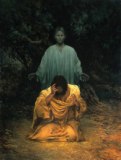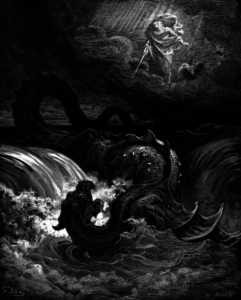Dark Is The Stain: Hallow’s Eve
I began this series because I wanted to explore the dark themes of Christian fiction. I don’t want to just discuss it; I want to touch it. I want light so bright that anything dark distracts, and darkness so black the tiniest speck of light blinds us. I want to see dead men come to life and living men exposed as dead. Show me the monsters, the demons, the cruelty of men; let me see the bleak underbelly of sin and smell the decaying corpses inside open, beautified graves.
Let me see the dark fury of a good man and the horrible sacrifice of the righteous.
Take me to hallowed ground and show me where the blood was spilled.
Take me to a borrowed tomb and let’s see that its intended guest was buried elsewhere. Now there’s a mystery.
Hallow’s Eve: Where Heaven and Hell meet and the saints spring from their graves; where the Long Dark begins, and the Supernatural kisses the earth. Hallow’s Eve, such fertile ground for spinning tales of ghosts and good and evil, where angels and demons are on the hunt and we mortals delve into what we don’t understand.
I have a friend who has, among several, a goal in life to make me appreciate the truths to behold in genres I wouldn’t normally read. He pulls redemptive themes from stories that stretch my toleration, then challenges me to a better perspective. He convinced me to give Harry Potter a shot, taught me the value of vampire stories and Harry Dresden novels, and is still working hard at pulling me into the zombie and werewolf lore (he’s had a far easier time with the werewolves than vampires or zombies).
It helps me to understand the truths expressed in Mr. Godawa’s posts on the horror genre and glean depth from chick-flicks and Disney cartoons. Buffy and X-Men. Children’s books about lost seals and wonderful retelling of the Rumpelstiltskin story.
The Supernatural exists.
I’m not sure we understand: The Supernatural exists.
I befriended this Catholic writer who likes to write stories about angels. She said her fascination developed as she studied books on angels and realized that there was no need to create fantasy worlds when an entire realm of reality exists that we just don’t know much about. Angels and demons exist; why not write them?

The Psalms says Adam’s race was made “a little lower than the angels,” and Lewis called us half-breeds. Before the creation of the cosmos, the Spirit of God hovered over the deep; and the earth was void and formless. There was no light yet. There were no stars, sun, moon, planets, angels, or demons. Then God created everything, and put little mud people — both spirit and flesh — in command. Then we broke the universe.
From Scripture we glean easily that two armies are at war: Terrifying people whose presence shines like the sun and makes men fall to their knees, riding chariots and wielding bows, swords, and spears. They ride on horses or fly through the heavens and some are so fierce they’ve been chained up and locked away until the last battle. They gang up on demons together (Daniel) and fight over human bodies (Jude).
I think we possibly misunderstand why sorcery and magic are condemned in Scriptures. Jesus had the perfect opportunity to say “there are no ghosts” out at Galilee, but instead he only says “I’m not a ghost.” Saul’s medium didn’t just conjure a demon; she summoned Samuel’s ghost. Now try that one on for size: The man died and went to heaven, and a medium summoned his soul. So, rather clearly, God isn’t saying “Don’t communicate with the dead because they’re really demons.” He means “don’t communicate with the dead.” It’s not that it can’t be done; it’s that it shouldn’t be done.
Similarly, you have magicians in Egypt who could mimic the “water to blood” trick on the small scale and the “staff to snake” trick; you had Balaam son of Peor (remember the Balaam’s donkey scenario?) who, though pagan, conversed rather freely with the One True God; and you had astrologers from the East visit Jesus’ house. Again, it’s not that these tricks can’t be done, but that they shouldn’t be.
But you have other odd things, too: Prophets teleporting (Obadiah was concerned the Spirit would whisk Elijah off and get Obadiah killed); people disappearing into the heavens (Elijah, Enoch); judges and soldiers with sudden superhuman strength; smoke, fire, and a voice billowing down from a mountain; large bodies of water parting, then crashing down on enemies; the earth splitting open under the feet of rebels; donkeys talking; bears devouring teenage gangsters; huge fish swallowing men alive; tax money turning up inside fishes’ mouths; smoking pots hovering over the ground; and demon-possessed men, women, children, and animals. 
The Supernatural exists.
I think my Catholic correspondent was right: There’s an entire reality right at our fingertips, and we’re smack in the middle of something we can’t see most of the time but very much feel.
Halloween. I’ll be honest, on the surface, the 31st of October holds absolutely no value in my mind. I said in a comment last week that I associate the 31st more with Reformation Day (the day Martin Luther nailed his 95 Theses on the door of the church) than trick or treating, fall festivals, Samhain, witches, demons, or anything else.
But, as with all good spook stories, the best story-fodder lies beneath the innocent trick or treaters on their annual candy drive with their friends and neighbors. And Halloween has so many varying, conflicting stories behind it that the truth lies buried somewhere near the middle of the pile just waiting to be unleashed.
Of course, we all know what happens once ancient things get unburied.











































*clapping hard*
Amen.
Kaci, it’s great to listen to you rhapsodize!
It seems that, as long as we cherish our mariner’s tools, and as long as a holy wind fills our sails, Christian writers and readers can navigate dangerous seas when asked to. Perhaps we are being asked to.
Now that was well said.
Thanks, Kaci!
Maria
Mom! Kaci’s digging in the back yard again!
My sister would’ve brought her own shovel. 0=)
Brilliant post, Kaci. Thanks.
I want to go exploring with you.
But a word of warning:
I think you unleash the wrath of Christians when you make angels the heroes. I wrote a story for my granddaughter and disguised them under the name ‘Greatwings’ for that reason.
It kinda depends. No one really screamed much over Touch By an Angel’s heroes, who were, in fact, the angels. At least, not that I’m aware of. I definitely think there’s a right and wrong way to do everything, and I think mostly people get squeamish over anything that smells of angel-worship, which is a legitimate concern, as it’s happened. Personally, I change the name, too, but largely because I feel the word “angel” no longer invokes the respect it should.
Btw, “Greatwings” is cool. Very cool. 0=)
Great post, Kaci. I’m with you on the vampires, zombies thing, too. 😉
Just for the sake of being controversial, let me raise a question. Yes, the supernatural world is real! What an important point and how necessary it is for us Christians to affirm that truth (God Himself, being supernatural, and all 😀 ). Certainly demons and angels can fill the pages of speculative fiction … certainly it can be done, but should it be done?
I see two drawbacks to what we often refer to as supernatural suspense. 1) Our limited knowledge. We have little to go on from Scripture and there really isn’t another source book, which leaves us to our imagination and the second drawback. 2) If we adhere to Scripture we will be theologically sound, but limited in what we can do in our stories; if we let our imagination go, we will be inventing things about real beings which might lead people into false thinking.
Case in point. In response to a YA Christian fantasy about supernatural beings, one letter writer thanked the author for making these Biblical things clear. Uh … the “Biblical things” were the author’s inventions.
I like the approach Bob took. It’s one thing for an author to think, this is the way I imagine angels and I’ll call them Greatwings. But somehow saying, This is what angels are like and I’ll call them angels, in my mind, moves the story from speculative to historical or contemporary — precisely because we’re then talking about and identifying real beings. Just like historical figures need to be researched and accurately portrayed, it seems to me supernatural beings should be as well, hence limiting the actual speculation.
But Greatwings. Now you can speculate all you want about Greatwings! (Can you tell, I like the name too> 😉 )
Becky
Becky, I’d go with Eric Wilson’s Jerusalem’s Undead trilogy and John Olson’s Shade and Powers for vampire books.
I say yes, but let’s play.
Scripture has a ton you can pull if you glean the interactions to be had. Now that you’ve mentioned it, I’ve got it in my head to go do a comparison study of the angels and demons in Scripture. That’ll be fun. I really don’t have a problem with using people’s personal accounts with the supernatural, keeping in mind such a study probably requires a ton of prayer.
I think there’s still plenty of room to not breach the sound barrier (had to, hehe) while speculating.
Two things:
1. I agree authors should be conscientious. People are weird.
2. I think if a reader checks their brain at the cover, it’s their own fault.
To further the answer, though, I can think of plenty writers who did use angels and demons, and, in fact, either set the tone for such genre or used the pioneers of said genre as their guides.
Yes, changing names allows much more room for speculating with much less room for error, but I might have to counter, Becky, that I’m pretty sure a reader could quickly figure out what the renamed being is — thus not necessarily fixing things.
Bob is cool. I want to read this story now.
I’ll give you that, yes, writers should strive to be as accurate as possible. The truth is, though, there’s still plenty of room to play. I mean, if I had angels behaving like demons, okay, we might have an issue. But whether or not angels can walk through walls is negotiable.
Wow Ma’am! I appreciated your honest and balanced look Scripturally at such an issue. I most wanted to tell you that you wrote so beautifully. I was honestly carried along. You have been given such a great gift by God. Keep it up Ma’am. 🙂 Just wow! Great writing!
Off topic, sort of, except that you mentioned Buffy.
My daughter and I watch Buffy on Netflix. And it has brought up so many topics for us to discuss that wouldn’t normally come up.
I started watching Buffy because of this remix and the fact that I was tired of seeing women portrayed as weak victims in much fiction.
I like strong male characters. I also like strong female characters.
I also want my daughters to avoid bad relationships and see warped, stalker-love for what it is.
Hahaha. I’ve seen that! It’s awesome. I sent it to a friend who loves Twilight. I only watched a few random episodes of Buffy, but enough to appreciate the humor of the video. I wholly agree with you on strong male and female characters and avoiding bad relationships.
Also, thanks for all the encouraging words, everyone.
Kaci, everyone, did you receive an email with promo materials for Brian Godawa’s novel NOAH PRIMEVAL? This book, the first in a planned series of three, is about what Genesis 6:1 and following may have been like.
Maria
Maria, ironic that you should mention it. We just added Noah Primeval to the library and Brian will be guest blogging again in two weeks.
Becky
I didn’t, no’m. Very cool.
Yes! That sounds great.
I never thought of Halloween in that way or the Bible in that way. Wow. Powerful post.